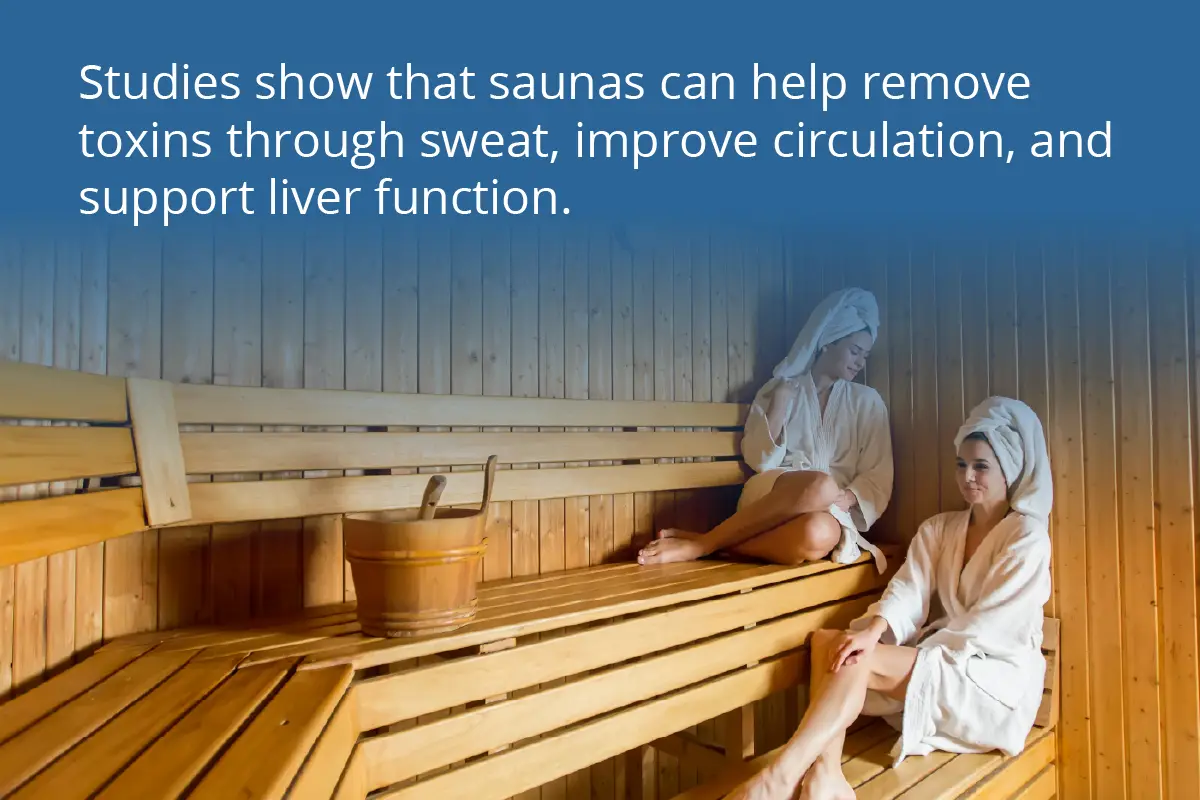Heat And Healing: Sauna Alcohol Detox
Other Categories

The Role of Saunas in Alcohol Detox: Benefits, Risks, and Recovery Support
Saunas are effective in detoxifying the body, especially during alcohol recovery. They help flush out toxins that accumulate from alcohol use. Using a sauna can speed up the detox process and support overall health during recovery.
Exploring sauna benefits can reveal how it aids in alcohol detox. While saunas offer many advantages, they also come with certain risks. Continue reading to uncover valuable insights on how saunas can assist in alcohol recovery and what to consider.
Key Takeaways
A sauna provides a warm, relaxing environment that promotes sweating and detoxification. Here’s what you need to know:
- Sauna alcohol detox: helps eliminate toxins through sweating, supporting the body’s natural cleansing process.
- Different saunas: offer unique characteristics, including heat settings, humidity levels, and therapeutic benefits.
- Sauna detox provides: benefits like toxin removal but has potential risks that need consideration.
Saunas and Alcohol Detox: A Natural Boost for Recovery
- Alcohol enters the bloodstream rapidly: after consumption and affects the body by impacting the liver and brain. The liver undergoes strain to metabolize alcohol, and excessive consumption can lead to damage. Additionally, alcohol slows reactions and impairs judgment by affecting the brain.
- Sauna detox: is a process that uses heat to help remove toxins from the body. In a sauna alcohol detox, the high temperatures make you sweat, which can help expel alcohol-related toxins. This process might improve circulation and promote relaxation, which aids detoxification.
- Spending time: in a sauna can also boost mental well-being during alcohol detox. The heat helps release endorphins, which are chemicals that improve mood. This can help reduce stress and anxiety levels, making the detox process more manageable.
- However, sauna detox should be done carefully: It’s important to stay hydrated because sweating causes fluid loss. Individuals should consult with a healthcare provider before starting sauna detox to ensure it’s safe and suitable. Not everyone will experience the same benefits, so personalized guidance is essential.
- The body detoxifies: alcohol through the liver, which breaks alcohol down into harmless substances. This process takes time, and excessive alcohol can harm the liver. The kidneys and sweat glands also help remove toxins from the body.
- Saunas promote detoxification: by making you sweat. Sweating helps remove toxins from the body. Saunas also improve blood circulation, which can support the liver in detoxification. The heat from saunas relaxes muscles and can reduce stress.
- Scientific evidence and research: Research supports sauna use for detoxification. Various studies show that saunas can help remove toxins through sweat, improve circulation, and support liver function. Scientists continue to study saunas’ effects on detoxification, providing more evidence of their potential benefits.
Types Of Saunas Used In Alcohol Detox
Saunas have been used for centuries to relax and improve health. They play an important role in alcohol detox by helping the body release toxins and manage withdrawal symptoms. Different types of saunas offer unique benefits. These saunas can improve blood flow, relieve pain, and support mental health.
Traditional Finnish saunas are heated with dry heat in a small room. The room’s temperature rises using a stove or heated stones. This sauna helps increase blood flow and improve heart rate. Regular saunas can also support the immune system and provide health benefits like pain relief and improved mental health.
Infrared saunas use infrared light to heat the body instead of the air directly. Infrared heat waves penetrate the skin, increasing body temperature. This can help blood vessels expand, improving circulation. Infrared sauna use is an effective way to help the body release toxins during detox.
Steam saunas create a humid environment. The moist heat helps open pores and cleanse the skin. People often use steam saunas to relieve withdrawal symptoms and reduce inflammation. They can also help lower blood pressure and promote relaxation.
Exploring the Benefits and Understanding the Risks
- Sauna detoxification: can play a huge role in alcohol recovery. It uses heat to enhance the detox process. Patients often experience improved physical health and overall well-being. Saunas can be a natural way to support sobriety, especially under medical supervision.
- Sweating and toxin elimination: Traditional saunas encourage sweating, which helps eliminate toxins. This process is essential for alcohol withdrawal and detoxification. By sweating, the body can rid itself of substances like alcohol, supporting recovery from substance abuse.
- Enhanced circulation and blood flow: Sauna sessions can significantly increase blood flow. The heat causes blood vessels to expand, boosting circulation. This enhanced blood flow can positively affect overall health by delivering more oxygen and nutrients.
- Improved sleep patterns: Saunas may improve sleep patterns. The relaxation and stress relief from a sauna session helps regulate sleep. This benefit is crucial for individuals recovering from alcohol abuse, as proper rest aids the entire process of healing.
- Relaxation and stress relief: Sauna bathing provides relaxation and reduces stress. The warmth helps muscles relax, easing tension and muscle cramps. This relaxation can have a positive effect on mental health, supporting those recovering from alcohol addiction.
- Sauna usage has several potential risks and considerations: People with certain medical conditions, like high blood pressure or a fatty liver, may face health issues. Excessive heat can affect internal organs and the Autonomic Nervous System, leading to severe health issues.
- Dehydration and fluid balance: Dehydration is a significant concern with sauna usage. The body loses water quickly through sweat in the heat. Maintaining fluid balance is crucial to avoid dehydration. Low blood pressure and dizziness can occur if fluids aren’t replenished properly after sauna sessions.
- Overheating and heat stroke: Overheating in a sauna can lead to heat stroke. Excessive heat causes the body’s internal temperature to rise rapidly. This can harm the internal organs and the Autonomic Nervous System. Lower temperature settings, like those in a far infrared sauna, may help prevent overheating.
- Interaction with medications: Sauna usage may interact with certain medications. Drugs that affect the body’s ability to regulate temperature can be problematic. Saunas might intensify side effects, especially for those with mood swings or weight loss drugs. Always consult a doctor before using a sauna with medications.
- When to avoid sauna use: There are times when sauna use should be avoided. People with severe health issues or specific medical conditions, such as high blood pressure, should be cautious. If you experience various aches or other health issues, it’s best to skip the sauna and seek medical advice.
Integrating Saunas Into An Alcohol Detox Program
Integrating saunas into an alcohol detox program can boost recovery. Saunas help the body release toxins through sweat, supporting liver function. The heat from a sauna also promotes relaxation, which can ease withdrawal symptoms. Regular sessions can improve mood and reduce stress, making it easier to stay sober.
Saunas enhance circulation, which helps the body heal during detox. Better blood flow supports organ recovery and improves skin health. The calming heat can also improve sleep, often disrupted during detox. Overall, saunas provide a holistic approach that aids physical and mental recovery.
Including saunas in a detox program requires careful planning. It’s important to monitor hydration levels and ensure safe use. Participants should listen to their bodies and avoid overheating. When combined with other treatments, saunas can be a valuable tool in alcohol detox programs.
Yes, Treatment Here Is Covered by Insurance
Don’t see your insurance? Don’t worry, most plans cover treatment here. Any costs to you is as low as possible – sometimes even zero.
100% Confidential
Get Your Questions Answered
Navigating the journey to recovery can bring up many questions. Below are some of the most commonly asked questions about our services. If you need more information or have additional questions, we are only a phone call away.
Does sauna detox the liver?
Using a sauna can support overall health by making you sweat, which helps remove some toxins from your skin. However, saunas do not directly detoxify the liver. The liver is responsible for filtering toxins from your blood and is not affected by sauna use. While sweating in a sauna can aid in overall detoxification, it is not a replacement for a healthy diet and lifestyle.
To effectively support liver health, focus on drinking plenty of water, eating nutritious foods, and avoiding excessive alcohol or harmful substances. Saunas can complement a healthy lifestyle but should not be solely relied upon for liver detox.
Can you sweat out alcohol toxins?
Sweating out alcohol toxins isn’t very effective. Alcohol is mainly processed by the liver, not through sweat. The liver breaks down alcohol into less harmful substances. These substances are then removed from the body through urine and breath.
When you sweat, your body releases water and salts, not alcohol. Drinking water and staying hydrated helps your body flush out toxins better. Regular exercise and a healthy diet support liver function. While sweating helps overall health, it doesn’t significantly speed up alcohol removal.
Are there any risks associated with sauna alcohol detox?
Sauna alcohol detox can carry several risks. The high heat of a sauna may cause dehydration, which can be dangerous. Alcohol withdrawal already stresses the body, and adding extreme heat can worsen symptoms. People with heart issues or high blood pressure should be cautious, as the heat can increase their risk of complications.
Additionally, sauna use alone is not a complete detox method. It should be combined with proper medical treatment and support. Always consult a healthcare provider before starting any detox program to ensure it’s safe for you.


Does Niacin Help with Alcohol Detox? Benefits and Recovery Tips Certain vital nutrients are known

Lamotrigine, also known by the brand name Lamictal, is a medication for epilepsy that also

Introduction To 3-Day Alcohol Detox A 3-day alcohol detox is a short-term program designed to

The Role of Saunas in Alcohol Detox: Benefits, Risks, and Recovery Support Saunas are effective

Suboxone, a medication commonly used for opioid addiction treatment, has shown potential benefits in managing

If you’re wondering how long alcohol stays in your system, it’s helpful to understand the
Have Questions? Let’s Talk!
Let’s talk about what’s going on — no judgement. (We’ve been there before ourselves). No one will know you inquired and there is no commitment to call.
24/7 Support
Need someone to talk to? We’re always here—day or night.
No Commitment
Ask questions, get guidance—no pressure, no obligation.
100% Private
Your story stays with us. Confidential support, always.
